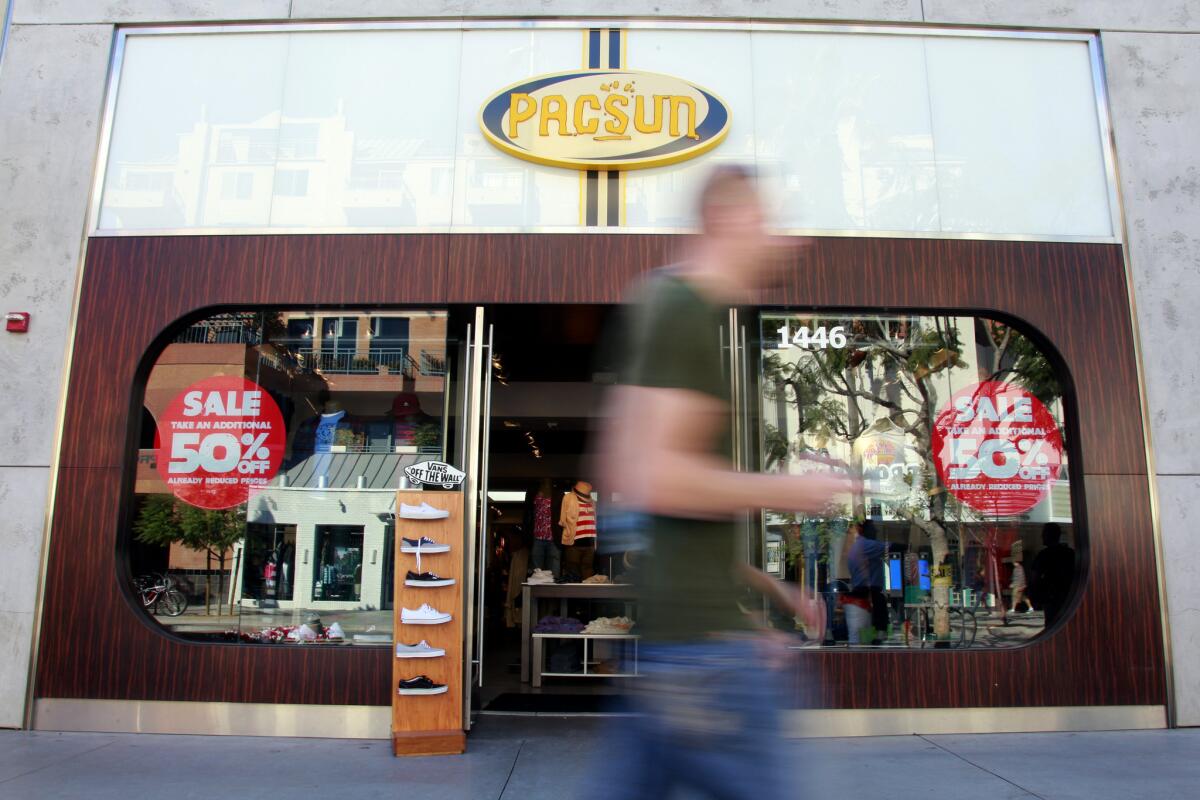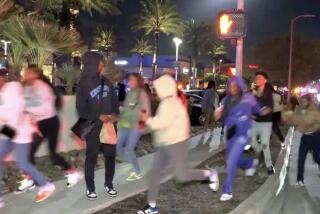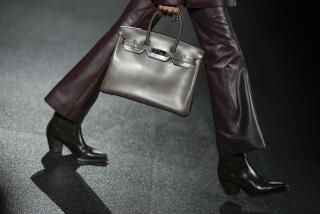PacSun files for Chapter 11 bankruptcy protection, plans to go private

The Pacific Sunwear store on Santa Monica’s Third Street Promenade. The Anaheim-based retailer has filed for Chapter 11 bankruptcy protection.
Beachy teen retailer Pacific Sunwear of California Inc. used to be the place to go for surf and skate apparel.
But on Thursday, the Anaheim apparel company commonly known as PacSun filed for Chapter 11 bankruptcy protection, the latest in a string of California teen activewear retailers that have struggled to adapt to changing fashion trends.
Those companies have been plagued by the same issues facing many apparel companies — the move toward online shopping instead of bricks-and-mortar stores, and the popularity of so-called fast fashion retailers, which quickly cycle through new looks and stay up-to-date with the latest styles.
“Fast fashion is killing these guys,” said Paula Rosenblum, an analyst with Retail Systems Research. “If the surf look is not in, you’ve got to pivot to another brand of styling.”
The best alternative for many of these once-popular teen retailers has been to streamline operations under the management of private equity firms.
PacSun said it planned to reorganize through a debt-for-equity restructuring agreement with Golden Gate Capital, a San Francisco private equity firm that counts restaurants such as California Pizza Kitchen and retail brands including Eddie Bauer as part of its portfolio.
The retailer said that it has no plans to close any stores and that the filing should have “no immediate impact” on customers or employees.
PacSun said it would implement its reorganization plan through the Chapter 11 process and emerge as a privately owned company. There are 593 PacSun stores across the U.S. and in Puerto Rico that employ about 2,000 full-time workers, according to the bankruptcy filing.
“The plan negotiated with Golden Gate Capital and approved by our board of directors places PacSun in a very promising position as we continue the brand and merchandising transformation that our team has worked relentlessly to achieve,” PacSun Chief Executive Gary Schoenfeld said in a statement.
The decline in the activewear trend has hurt fellow Orange County retailers Quiksilver Inc., which filed for Chapter 11 bankruptcy protection in January 2015 and emerged in February, and teen apparel company Wet Seal Inc., which also filed for bankruptcy in 2015 and emerged a few months later.
“There is a general pattern over the past two to three years of waning interest in surf and skate,” said Betty Chen, senior analyst with Mizuho Securities. “Some of the trend seems to be gravitating toward basketball and athletics, as well as more hip-hop or street fashion.”
Analysts said PacSun did evolve beyond its initial mainstay of surf and skate apparel, which has largely fallen out of favor with teen shoppers.
But PacSun made several missteps toward the end of the 2000s, including discontinuing the sale of sneakers in 2008, though it has since reinstated them, and moving toward less-expensive but unfamiliar private-label merchandise.
The retailer also expanded too rapidly, to nearly 1,000 stores, many of which were underperforming and had rent costs that were above market price.
SIGN UP for the free California Inc. business newsletter >>
The company began its turnaround under Schoenfeld in 2009. He started to move it toward a more general California casual style and added brands such as Brandy Melville and Kendall and Kylie — a clothing line designed by the Jenner sisters — that appealed to an older demographic.
The retailer also improved the look and shopability of the stores and cut down on some of its mall locations. Its same-store sales have been positive for 13 of the last 16 quarters.
“They certainly moved forward and improved the business,” said Jeff Van Sinderen, senior analyst at B. Riley & Co. “They made a lot of improvements, but at the end of the day, that just wasn’t enough.”
In its bankruptcy filing, Schoenfeld noted that “despite successfully reducing the store fleet and making consistent progress to improve operations, the company’s maturing capital structure and high store occupancy costs have proved untenable.”
In the fourth quarter, PacSun posted a 0.2% increase in same-store sales and a net loss of $10 million.
“They just had a really tough environment to operate in,” Van Sinderen said. “Things could have gone differently if mall traffic had been positive for the last few years and we didn’t have this ongoing shift to e-commerce. It’s a challenge for any mall-based retailer these days.”
Under the plan, Golden Gate Capital will convert more than 65% of its term-loan debt into the equity of the reorganized company. The private equity firm will give PacSun at least $20 million in additional capital after it emerges from bankruptcy to support its long-term growth objectives. PacSun will also receive $100 million in debtor-in-possession financing from Wells Fargo.
“PacSun has successfully transitioned beyond its historical base of action sports brands to what we believe is the most relevant and coveted mix of brands celebrating the California lifestyle,” Josh Olshansky, managing director at Golden Gate Capital, said in a statement. “While there is still work to be done, we are supportive of the steps the company and its management team have taken to position PacSun for success and growth long after emergence.”
After the company emerges from bankruptcy, Van Sinderen said, it will probably be in a better financial position with less debt to service and potentially lower rents on stores. But PacSun will need to continue its brand improvements.
“It’s a matter of continuing to evolve,” he said. “I would say the same thing for every apparel retailer.”
For more business news, follow @smasunaga.
ALSO
Snapchat is trying to remake its image by giving back to its Venice neighbors
The first lower-priced Whole Foods is coming to Los Angeles in May
Harry Potter could make Universal Studios a real rival to Disneyland







